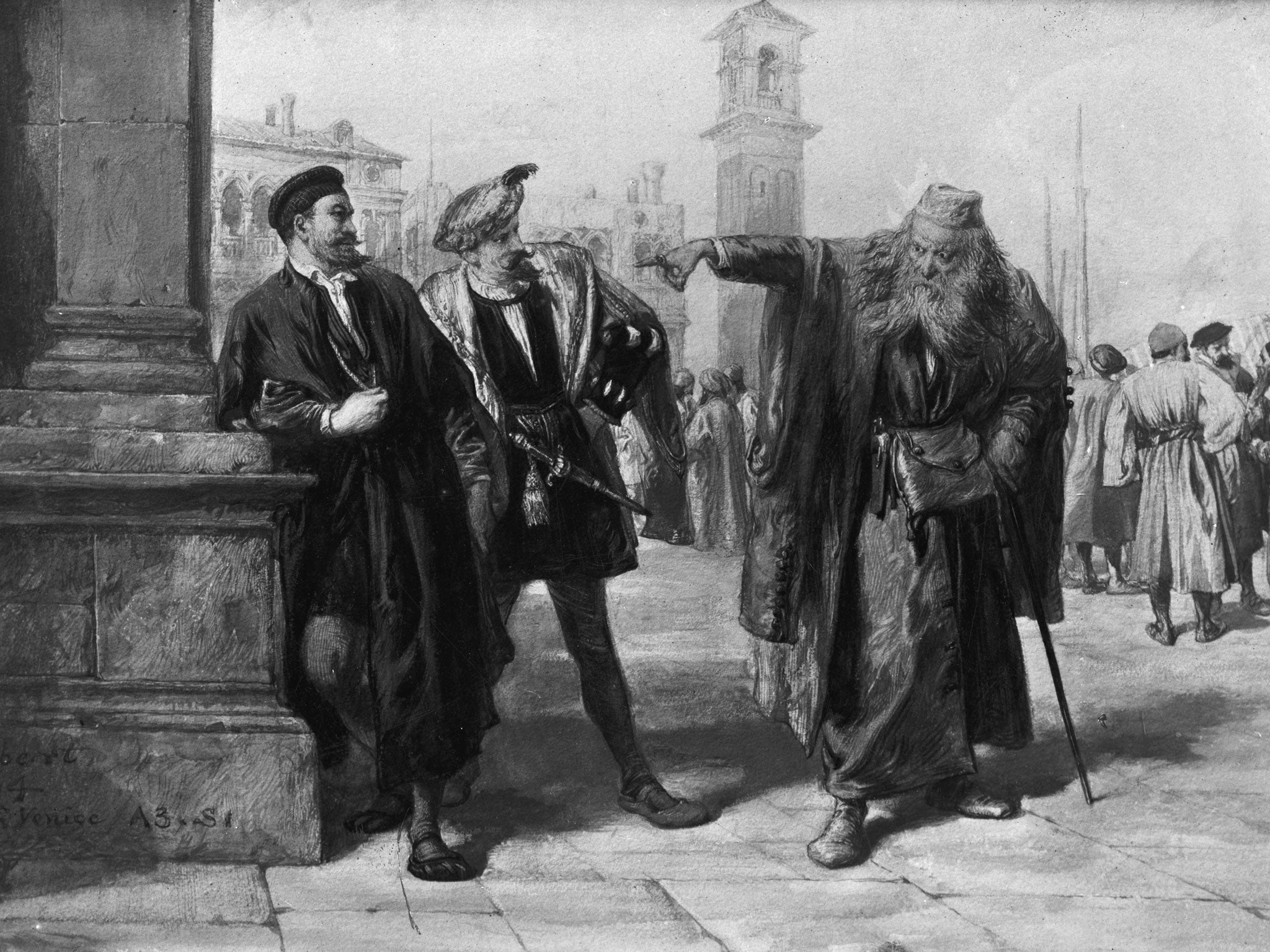Shylock is My Name by Howard Jacobson, book review
A retelling of 'The Merchant of Venice' that, says Lucasta Miller, is supremely stylish, probing and unsettling

Your support helps us to tell the story
From reproductive rights to climate change to Big Tech, The Independent is on the ground when the story is developing. Whether it's investigating the financials of Elon Musk's pro-Trump PAC or producing our latest documentary, 'The A Word', which shines a light on the American women fighting for reproductive rights, we know how important it is to parse out the facts from the messaging.
At such a critical moment in US history, we need reporters on the ground. Your donation allows us to keep sending journalists to speak to both sides of the story.
The Independent is trusted by Americans across the entire political spectrum. And unlike many other quality news outlets, we choose not to lock Americans out of our reporting and analysis with paywalls. We believe quality journalism should be available to everyone, paid for by those who can afford it.
Your support makes all the difference.The merchant of venice is perhaps Shakespeare's most troubling play. Most scholars now tend to see the work as simply reflecting back the ingrained cultural anti-Semitism of its time, but the fecund multiplicity of Shakespeare's language continues to make Shylock more complex than a straight villain demonised beyond empathy. The play wants to objectify him as the "other", but the playwright's imagination gives him a self.
This is, of course, what Shakespeare also does with a host of openly unsavoury individuals, including outright murderers such as Macbeth. His famous ability to get inside all of his characters makes his plays infinitely rich but, in this case, infinitely discomfiting. By humanising Shylock, is Shakespeare inviting us to question his contemporaries' anti-Semitic attitudes or employing a particularly subtle ruse to make us complicit in those abhorrent views?
"These Jews! They don't know whether to cry for me, disown me or explain me," exclaims the title character in Shylock is my Name, Howard Jacobson's updating of the story, which interrogates the terms of the original play, but also broadens out into an exploration of modern Jewish identity.
The narrative is set among the mansions of Cheshire's so-called "golden triangle". It focuses on Simon Strulovitch, a fabulously wealthy middle-aged art collector and philanthropist whose conflicted relationship with his own Jewishness forms a running thread in the story. His father disowned him for marrying outside of his faith first time round. The marriage failed because he refused to play up to his wife's overly romantic views of his Jewish heritage (she imagined noble Cordoba; he offered her dirty jokes from the shtetl). When he chose a Jewish second wife, his father welcomed him back, but she was tragically disabled by a stroke. When we meet him, Strulovitch is caring single-handed for their rebellious, over-sexed teenage daughter.
So far so naturalistic, but in an early moment of magical realism Strulovitch encounters his doppelganger in a graveyard: Shylock, who has become the eternal wandering Jew, a character in search of the closure denied him in Shakespeare's play. This Shylock is a sympathetic character in his private life, forever mourning his beloved wife. His monologues over her grave are truly touching. In his dialogues with Strulovitch he is both savagely funny and intellectually searching, both wise and sophistical, intimate and coldly controlling.
He is also addicted to self-analysis. "Was I acting out my desires or theirs?" he asks, pondering the deep psychology behind his demand for a pound of flesh from a Christian Jew-hater. The irony on which Jacobson so expertly plays is that of making Shylock – about whom critics have asked so many unanswerable questions – a character who questions absolutely everything.
In the "golden triangle" world of Porsches rather than Portias, many of the characters are drawn as caricatures: the manipulative It girl turned reality TV star called Plurabelle; the dim-witted footballer who's been sent off for making a Dieudonné-style Nazi salute on the pitch without realising what it meant; the sinister art connoisseur who submerges his residual anti-Semitism under a polite veil of high culture and non-racism (the latter is a chillingly believable picture of modern prejudice). This near-pantomime element reflects the absurdism in which Jacobson often takes refuge when faced with a philosophical or critical impasse.
Shakespeare's text is riddled with disturbing lacunae. Jacobson poses all those bothersome questions you were too afraid to ask, such as how did the site of Shylock's revenge suddenly become the heart rather than flesh from any other part of the body? Why couldn't it have been, for example, the penis? This startling suggestion turns out to make a lot of sense given the thematic strand in the novel which ends up fuelling its witty denouement: circumcision. With a nod to Philip Roth, Jacobson has an awful lot to say on the subject.

While his plot can on occasion seem a little convoluted (something which could, admittedly, also be said of Shakespeare's), Jacobson's writing is virtuoso. He is a master of shifting tones, from the satirical to the serious. His prose has the sort of elastic precision you only get from a writer who is truly in command, whether he's discussing masturbation or Zionism, commenting on middle east politics or referencing Kafka and the pre-Raphaelites. He never uses his braininess to cynical or meretricious ends. There's also deep and sincere soul-searching going on here.
This novel is a highly rhetorical artefact whose rigour and vigour resides in the dialogue, the voices, and the subtlety of argument. But under the stylised characterisation and intellectual pyrotechnics, Jacobson explores some heartfelt psychological insights into family conflicts. One of the most distressing aspects of The Merchant of Venice is Shylock's betrayal by his daughter Jessica, who runs off with her Christian lover and steals her father's money, which she ultimately spends on a monkey in an act of frivolous yet obscurely symbolic bizarrerie. You'll find lots of ideas as to why it was a monkey here, but Jacobson also tries to see the generational conflict from both viewpoints, wondering whether Jessica was reacting against her father's emotional absence in his grief at being widowed. His portrayal of the parallel relationship between Strulovitch and his daughter Beatrice – who is threatening to marry the footballer with the Nazi salute – rings true in its exploration of paternal possessiveness.
Shylock is My Name is the second novel to be published in Vintage's Hogarth Shakespeare series. Future titles include rewrites of The Tempest (Margaret Atwood), The Taming of the Shrew (Anne Tyler), Othello (Tracy Chevalier) and King Lear (Edward St Aubyn). On the strength of what we've seen so far I'm looking forward to them. Shakespeare himself was a borrower of other people's stories, forever making something new from existing sources, and inviting his audiences to give his characters an afterlife. These modern retellings could not capture his spirit better.
Hogarth, £16.99. Order at the discounted price of £14.99 inc. p&p from the Independent Bookshop
Join our commenting forum
Join thought-provoking conversations, follow other Independent readers and see their replies
Comments